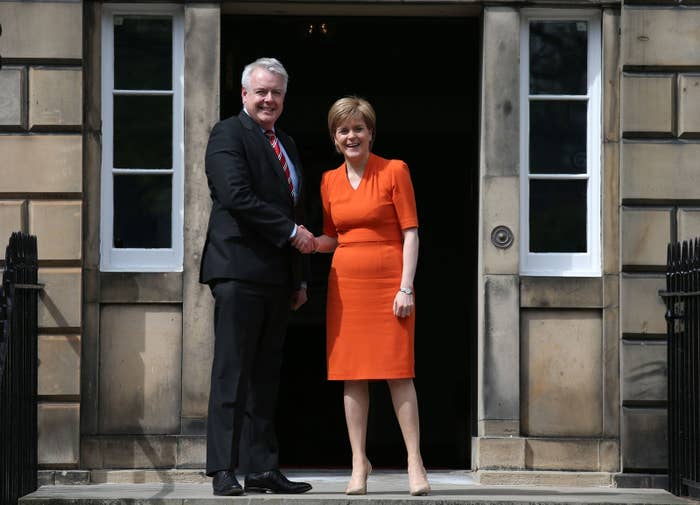
The Scottish and Welsh governments have reacted angrily to the publication of the UK government's EU withdrawal bill – formerly known as the "great repeal bill" – on Wednesday, saying that they cannot give their consent to it as things stand.
The key piece of legislation, which sets out how current EU law will be transferred into UK law after Brexit, does not explain which powers will be devolved to Scotland and Wales, or when the devolution of further powers might happen.
In a joint statement on Wednesday, the Scottish and Welsh first ministers – Nicola Sturgeon and Carwyn Jones – said the UK government had "failed utterly" to compromise with their governments and that the bill was "a naked power-grab".
The Scottish and Welsh parliaments need to give their consent to the bill under the UK's constitutional arrangements because it will directly affect their powers, but it's unclear what would happen if such consent was refused.
Legally, the UK government could still pass the EU withdrawal bill without the consent of the devolved parliaments, but experts have previously told BuzzFeed News that would cause an unprecedented constitutional crisis.

“The [EU withdrawal bill] does not return powers from the EU to the devolved administrations, as promised," read the statement from the first ministers.
"It returns them solely to the UK government and parliament, and imposes new restrictions on the Scottish parliament and National Assembly for Wales. On that basis, the Scottish and Welsh governments cannot recommend that legislative consent is given to the Bill as it currently stands."
The devolved parliaments are unhappy that the bill will replace the current restriction that they can't amend EU laws with a new restriction that they'll be unable to amend the EU laws that are returned to the UK after Brexit.
The part of the bill the first ministers have complained about reads: "A member of the Scottish government has no power to make, confirm or approve any subordinate legislation so far as the legislation modifies retained EU law."
The first ministers' statement continued: “The Bill lifts from the UK government and parliament the requirement to comply with EU law, but does the opposite for the devolved legislatures: it imposes a new set of strict restrictions.
“We have explained these points to the UK government and have set out what we consider to be a constructive way forward in the spirit of co-operation, based on the involvement of, and respect for, devolved institutions.
“Unfortunately, the conversation has been entirely one-sided. We remain open to these discussions, and look forward to coming to an agreed solution between the governments of these islands.”
S.11 of #RepealBill effectively means @ScotParl can't legislate on repatriated EU laws in devolved areas without UKG permission.
Speaking to journalists on Wednesday afternoon, the secretary of state for Scotland insisted the bill will start what he believes will be a "powers bonanza" for Holyrood as powers return to the UK and are then devolved.
On the subject of needing the consent of the Scottish parliament to pass the bill, David Mundell said he was “confident” about winning that consent but, despite repeated questioning, refused to say what would happen if he didn’t.
“I am optimistic that we will obtain that consent,” he said. “Partly because I was told in relation to the 2012 bill, the 2016 bill, the fiscal framework bill, that this consent would not be forthcoming and ultimately it was.
“If it’s not forthcoming there would have to be an explanation to people in Scotland as to why the SNP opposed the bringing into Scots law of European law and why they opposed the Scottish parliament having additional powers.”
Mundell conceded the Scottish parliament will have to consent each time in the future when the UK government wants to create new laws after Brexit which directly affect the powers of Holyrood.
